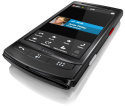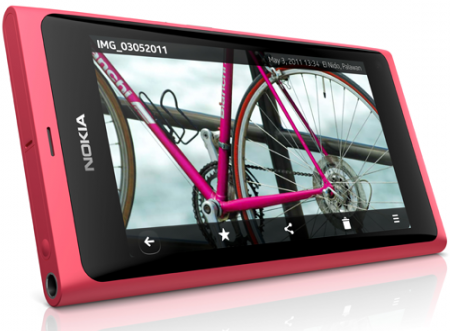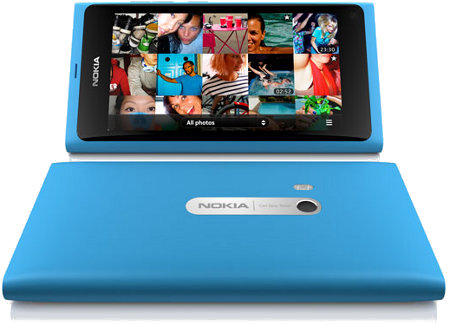MeeGo and LiMo to merge, report claims, as MeeGo-driven Nokia N9 reaches market
Sep 27, 2011 — by Eric Brown — from the LinuxDevices Archive — 4 viewsThe Linux Foundation's MeeGo project will merge with the LiMo (Linux Mobile) Foundation's LiMo spec, bringing together two struggling open source mobile Linux projects, according to an industry report. Meanwhile, Nokia shipped the 3.9-inch Nokia N9 — the first MeeGo-driven smartphone, and most likely the last.
Failed open source projects do sometimes fade away, but just as often, their code and/or other assets is folded or merged into other open source projects. This occurred when Intel's Moblin and Nokia's Maemo mobile Linux projects were merged into a new MeeGo project in Feb. 2010.
Nokia backed off from MeeGo earlier this year as it repositioned itself around Windows Phone, and has now finally shipped one MeeGo device in the form of the previously announced N9 phone (see farther below).
Now MeeGo — which is formally run by the Linux Foundation and backed by Intel — will merge with the older, more specifically smartphone-oriented LiMo (Linux Mobile) project, claims a Sept. 26 Financial Times Deutschland story [English translated version] that was picked up by the Register. The merger will be announced on Sept. 28, according to the story.
No more details were mentioned, so it's unclear whether MeeGo would move from the Linux Foundation to the LiMo Foundation or vice versa, or whether another arrangement is in the offing.
The LiMo Foundation is run by a consortium of powerhouse mobile phone operators and vendors around the world, but has had little impact outside of Japan, where it has appeared on Panasonic and NEC phones. Motorola was an early adopter, but abandoned the platform in favor of Android back in 2008.
 LiMo's major product launch outside of Japan was the Samsung-manufactured Vodafone 360 H1 (pictured), which faded fast in Europe. The group still pushes out updates to its open source Linux smartphone middleware spec, however, including a LiMo 4 spec released in February, which added the beginnings of tablet support.
LiMo's major product launch outside of Japan was the Samsung-manufactured Vodafone 360 H1 (pictured), which faded fast in Europe. The group still pushes out updates to its open source Linux smartphone middleware spec, however, including a LiMo 4 spec released in February, which added the beginnings of tablet support.
MeeGo's rise and fall has overlapped that of Limo, but began later. Intel recently denied rumors that it was selling its MeeGo assets to Samsung, and Samsung has done the same, more or less.
Yet, Intel has clearly shifted its smartphone strategy to Android. The company recently suggested MeeGo still shows promise in other areas, especially in-vehicle infotainment.
Nokia N9 ships
Nokia announced the release of the Nokia N9 smartphone in Europe, with a global launch due later this year. The N9 will likely be the only commercial smartphone from any vendor to run the Linux-based MeeGo operating system (see above for background on MeeGo).

Nokia N9
As reported by our sister publication eWEEK, the Nokia N9 will first be sold in Europe, and will then go on sale in countries around the world. The estimated retail price of the N9 is 480 Euros ($650) and 560 Euros ($760) for the 16GB and 64GB models, respectively. This is said to be before applicable taxes or subsidies, with pricing and availability varying from region to region and operator to operator.

Nokia N9, front and back
Available in black, cyan and magenta, the N9 features a unibody design with Gorilla Glass. The phone supports HSDPA (14.4Mbps) and HSUPA (5.7Mbps) 3G communications, and offers 802.11a/b/g/n, Bluetooth 2.1, and aGPS wireless communications, says Nokia. A Wi-Fi hotspot feature is also said to be available.
Other features are said to include an accelerometer, proximity sensor, 3.5mm headphone jack, and a microUSB 2.0 OTG port. The 1450mAh battery supports up to seven hours on 3G and 11 hours on 2G, says Nokia. (For more details, see our previous N9 coverage.)
Early reviews praised the phone on many counts, but few could overlook its two overwhelming flaws: a lack of apps and a defunct operating system. Whether or not MeeGo survives, it seems unlikely it will do so as a smartphone platform.
The N9 will rely on hobbyists and hackers to port other operating systems to the platform. Already Myriad Group's Myriad Alien Dalvik and OpenMobile's Application Compatibility Layer (ACL) promise to bring Android compatibility to MeeGo.
This article was originally published on LinuxDevices.com and has been donated to the open source community by QuinStreet Inc. Please visit LinuxToday.com for up-to-date news and articles about Linux and open source.